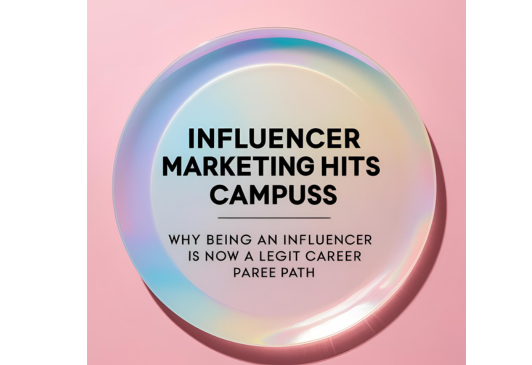Influencer Marketing Hits Campus: Why Being an Influencer Is Now a Legit Career Path
If you had told a university career advisor just a decade ago that students would soon be enrolling in degree-level courses on how to become an influencer, they’d likely have dismissed the idea. But fast-forward to 2025, and influencer marketing has become a major career path—and it’s a booming industry at that.
Across the UK, the US, and beyond, colleges and universities are now offering courses specifically designed for aspiring influencers. These programs teach students how to build personal brands, grow their followings, and—crucially—monetize their digital presence. From TikTok trends to affiliate marketing, influencer marketing is no longer a side hustle; it’s a legitimate profession, and it’s taken seriously.
But what exactly is behind the rise of “influencer studies,” and how does this impact affiliate marketers, content creators, and brands alike? Let’s dive into the changing landscape.

The Evolution of Influencer Marketing
From Accidental Fame to Strategic Careers
Gone are the days when internet fame was the result of a viral video or an accidental meme. Influencers no longer stumble into success without a plan—they’re now actively pursuing it. Being an influencer is no longer about just being “seen” online. It’s about building a real digital business with strategy, creativity, and professionalism.
The Rise of the Creator Economy
With over 50 million creators worldwide, the creator economy is booming—and it’s only getting bigger. Influencers today are running small businesses. They have marketing strategies, analytics dashboards, content calendars, and, in many cases, an entire team behind their work. These creators are serious entrepreneurs, and the education system is catching on.
The Emergence of University Courses for Influencers
Why Universities Are Jumping on the Trend
As influencer marketing becomes a staple of the global economy, universities are responding by offering tailored courses that equip students with the tools and knowledge they need to succeed in the field. These programs are designed to cater to the growing demand for digital careers, especially among Gen Z students who are already immersed in social media.
What Influencer Programs Include
University influencer programs aren’t just about selfies and viral content. They offer comprehensive education that includes:
-
Content creation (including photography, editing, and scriptwriting)
-
Understanding platform algorithms and how to grow an engaged audience
-
Legal frameworks, including ethical guidelines and ASA compliance
-
Affiliate marketing and brand partnership strategies
-
Analytics, contracts, and income diversification strategies
Skills and Knowledge Gained in Influencer Degrees
Students enrolling in these influencer-focused programs are learning how to run a digital business from the ground up. They’re acquiring skills that will help them not only become popular online but also professionalize their influence in the market. Think about it: they’re being taught how to build and sustain a brand—whether it’s their own or as part of a larger entity.
How Influencer Marketing Became a Serious Business
From Hobby to Structured Career
What once started as a fun hobby or creative outlet has evolved into a full-fledged, structured career. Influencers now require a deep understanding of business processes, including marketing, finances, and legal considerations. Being an influencer is no longer “just” about being on Instagram—it’s about running an actual business.
A Structured Approach to Content Creation
Influencers are no longer just sharing what they had for lunch. They’re creating content with intent, purpose, and an eye for long-term success. Today’s influencers are content strategists, photographers, and brand ambassadors all rolled into one.
Photography, Editing, and Content Planning
Courses in influencer marketing delve deep into how to produce high-quality content that speaks to an audience. Students learn how to edit videos and photos, how to plan a content calendar, and even how to script stories that resonate with viewers.
Platform Algorithms and Community Engagement
It’s not enough to simply post frequently; influencers need to understand platform algorithms (on YouTube, Instagram, TikTok, etc.) to grow their audience. Building a genuine community requires engagement and interaction—skills that are now taught in influencer programs.
Legal Compliance and Ethical Guidelines
With great power comes great responsibility. Influencers need to understand the legal landscape surrounding promotions, ads, and endorsements. Universities now teach students how to comply with advertising regulations, such as the UK’s ASA guidelines, which ensure transparency and authenticity.
The Role of Affiliate Marketing in Influencer Careers
The Shift from Brand Deals to Affiliate Revenue
Affiliate marketing has become a game-changer in the influencer industry. While traditional brand deals can be inconsistent and depend on follower count, affiliate marketing offers influencers the chance to earn money based on performance. This shift is empowering smaller influencers—like micro and nano influencers—who might not have massive followings but can still generate results.
How Affiliate Marketing Has Reshaped Influencer Income
In the past, influencers mainly earned money through sponsored posts, but now affiliate links are a major revenue stream. Influencers are learning how to use affiliate networks, disclose links according to regulations, and track performance using tools like UTM tags.
Joining Affiliate Networks and Tracking Performance
Influencer programs teach students how to integrate affiliate marketing into their strategies, whether by joining established networks like Amazon Associates or by creating their own affiliate partnerships with brands.
The Power of Niche Audiences and SEO
Successful influencers are learning the power of SEO and how it works with affiliate marketing. By building niche audiences and optimizing their content for search engines, influencers can drive organic traffic to their affiliate links, earning commissions without relying on huge follower counts.
Why Marketers Should Pay Attention to the New Generation of Influencers
A New Breed of Trained and Strategic Influencers
Unlike previous generations of influencers who relied mainly on personality and viral moments, today’s influencers are trained, strategic, and highly analytical. They know how to turn attention into dollars, and they do it with purpose. They understand the business side of content creation, including marketing, SEO, and analytics.
More Authentic, More Analytical, and More Professional
These new influencers are smarter and more professional than ever. They don’t just want to be famous—they want to build sustainable businesses. For affiliate marketers and brands, this means more high-quality partnerships with influencers who understand how to deliver real ROI.
What This Means for Brand Partnerships and Affiliate Networks
With the rise of well-educated creators, brands and affiliate networks can expect better quality partnerships. Influencers who understand the intricacies of SEO, affiliate marketing, and audience engagement will provide higher returns on investment.
What’s Next for Influencer Marketing Education?
A Growing Trend: More Universities Will Follow Suit
As influencer marketing continues to grow, expect more universities to launch these specialized courses. Some may offer these programs as part of broader marketing or digital media degrees, while others might offer short-form certifications or bootcamps.
Opportunities for Short Courses and Bootcamps
For those who don’t want to commit to a full degree, short courses and bootcamps will offer an alternative pathway to becoming an influencer. These programs provide hands-on, practical training in content creation, SEO, affiliate marketing, and more.
Collaboration Between Institutions and Tech Platforms
In the future, we’ll likely see more collaboration between universities and platforms like TikTok and Instagram, with tech giants co-sponsoring coursework or offering certifications for aspiring influencers.
Final Thoughts
Influencer marketing is no longer a passing trend—it’s a professional career path. As more universities embrace this reality, aspiring influencers now have access to the education they need to build a legitimate business. And as affiliate marketing plays a bigger role in their success, brands and affiliate marketers alike will need to stay ahead of this new wave of educated and savvy content creators.
FAQs
1. Are influencer degrees worth it?
Yes! These programs offer practical, actionable skills that can help you turn your passion for content creation into a legitimate career. They teach business strategy, legal compliance, marketing, and more.
2. How can influencers make money besides brand deals?
Affiliate marketing is a major income stream, as well as sponsored content, selling digital products, and running memberships or Patreon accounts.
3. Can you be an influencer without a degree?
Absolutely! Many successful influencers don’t have degrees. However, education can give you a solid foundation and help you grow faster, especially in areas like marketing, analytics, and business operations.
4. What skills do influencer programs teach?
Skills include content creation (photography, editing, scripting), understanding algorithms, SEO, analytics, brand partnerships, and legal/ethical guidelines.
5. Is influencer marketing here to stay?
Yes. As more people consume content online and brands continue to invest in influencer partnerships, influencer marketing will only grow stronger and more professional.
Ready to start earning?
Join hundreds of high-performing publishers. Get exclusive access to top-tier brands and high-payout campaigns today.
